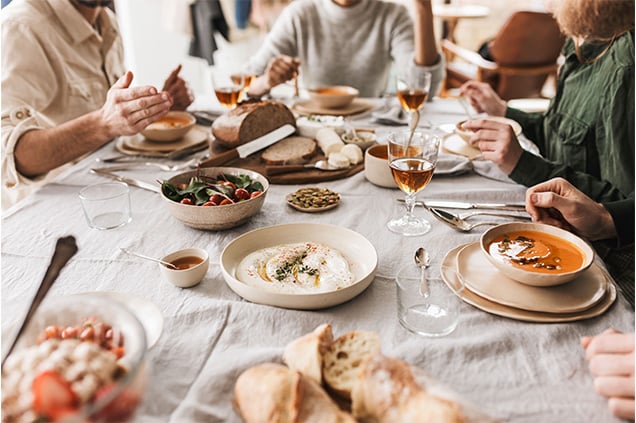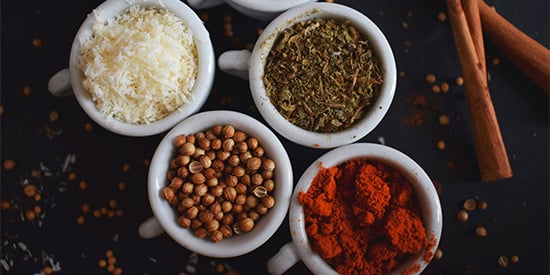Research to help refugees find nourishment in their new home
Research news
Summary
- Food insecurity is limited availability, access or ways to use food
- For recent arrivals to Australia, food insecurity is often complicated by the inability to find culturally appropriate or familiar foods
- Deakin PhD student and Visualise Your Thesis winner Julie Maree Wood is investigating how to help reduce food insecurity among refugees in Australia
Australia has an abundance of food, enough to waste 7.6m tonnes of it a year. So how is it that people are still going hungry in this country, including those who have settled here as refugees?
That’s the question that Deakin University’s 2024 Visualise Your Thesis (VYT) competition winner is hoping to answer.
A nutritionist and PhD researcher with Deakin’s Institute for Physical Activity and Nutrition (IPAN), Julie Maree Wood is a health promotion professional and the author of four health books, including the award-winning Feeding Fussy Kids co-authored with Antonia Kidman. Her PhD research focuses on refugee food security.
As Ms Wood describes in her winning VYT entry, ‘food insecurity is when there is limited availability, access or ways to utilise food’. In comparison, food security is being able to access enough food for a healthy active life.
Both were concepts she often found herself having to explain at the beginning of her PhD. Sadly, since the pandemic, things have changed.
‘Now when I tell people my PhD is about food security, I don’t need to explain it. We've seen it on our supermarket shelves,’ she says. ‘They've been empty for the first time for some of us in our lifetime and more people understand what it's like to not be able to reach out and get exactly what we want when we want.’
But for refugee and other disadvantaged populations in Australia, food security – or rather insecurity – has long been a fact of life.
For recent arrivals to Australia, the issue is often complicated by the inability to find culturally appropriate or familiar foods.
‘Food is about so much more than nutrition. Regardless of culture, language, ethnicity or background, there are few greater pleasures in life than to enjoy a good meal. And yet, for many, and not just people living as refugees, that is a daily struggle,’ Ms Wood says.
‘Imagine having to bring a child to a totally new land and not being able to give them enough food, or not being able to give them a plate of food that they recognise as home.’
Nourishment, not just fuel
 Adobe Stock
Adobe Stock
While the question of why people continue to go without food in a country like Australia and what to do about it drives her research, Ms Wood’s PhD topic is also connected to ‘the entwinement of food, culture and home’ and how the smell or taste of food ‘can transport us and connect us with times and people we love’. That’s something vitally important for people making a home in a new country.
‘I love nutrition science and it’s important, but there's something beautiful about food beyond that. I wanted to be a part of trying to connect people settling here with the food that they love and know as home.’
Having spent several years as a marketing and communications professional, Ms Wood’s interest in food and its connection to health and wellbeing saw her undertake a Master of Human Nutrition at Deakin.
‘I love good food and exploring the connection between food and health. And then my Master opened up the whole new world of public health nutrition to me, and so I continued down that path,’ she says.
‘Public health is an area where you can contribute to systemic change and help people who don’t necessarily have a voice in society or need a bit of a hand.’
Ms Wood has investigated what leads to food insecurity among refugees by analysing a large government database to report the prevalence of the issue and who is most at risk. She’s also analysed what print and online resources are currently available nationally to help build food security in refugee populations and is working with refugee settlement providers to find out how these resources are being used and can be improved.
‘I hope my work contributes in some small way to finding ways that help connect people settling here with food that can provide kilojoules, certainly, but can also bring a little bit of home to them.’
What's next in the VYT journey?
Ms Wood’s winning VYT entry is now through to the next stage of the VYT International Competition, as well as Trending on VYT. Trending on VYT is all about highlighting and sharing impactful research through social media platforms (#TrendingOnVYT #VYT2024).
Taking place from 10:00am Wednesday 16 October–10:00am Tuesday 22 October, the winner of Trending on VYT is determined by the highest number of clicks and/or views on their VYT entry during this time.
You can view Ms Wood’s winning VYT entry at https://doi.org/10.6084/m9.figshare.27048940.v1
And take a look at Deakin’s other VYT finalists’ entries on our YouTube VYT playlist.
The text of this article is licensed under the Creative Commons Attribution (CC BY) 4.0 International license. We'd love for you to share it, so feel free! Please note that images, videos, graphics and logos are not covered by the CC BY license and may not be used without permission from Deakin University or their respective copyright holder. If you have any questions, please contact researchcomms@deakin.edu.au.
Thanks for reading! You can find more stories like this at deakin.edu.au/research/research-news-and-publications. We ask that Deakin University and individuals are appropriately credited and that you include links back to this website. Quotes in this article can be extracted for other articles provided individuals are appropriately credited and you include a link back to the article URL.
Share this story

Key Fact
For recent arrivals to Australia, food insecurity is often complicated by the inability to find culturally appropriate or familiar foods.
